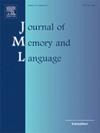在单词学习中,足够接近是不够的:成功的跨情景单词映射在语义上独立于之前的映射
IF 3
1区 心理学
Q1 LINGUISTICS
引用次数: 0
摘要
儿童经常在指代性和语义模糊的环境中遇到生词。因此,他们通常会对一个单词的意思做出许多错误的猜测,然后才得出正确的意思。在这里,我们询问这些最初的错误猜测是否可以通过提供关于单词的语义邻居的信息(例如,如果大多数猜测是食物,也许这个单词有与食物相关的含义)来帮助学习者。为了验证这一点,我们分析了之前任务中的数据集,在这些任务中,成年人猜测照顾者在与孩子互动时所说的单词。我们首先测试了成年人的错误猜测是否在语义上与正确的意思相似。在研究1中,我们确定学习者的错误猜测与目标词在语义上相似。然后,我们询问成年人是否成功地将这些语义相似的猜测作为“垫脚石”,以在不同的暴露中获得正确的意思。研究2表明,总的来说,学习者的猜测在语义上是一致的。然而,这种影响很小,并且正确的猜测不会被判断为与学习者先前的错误猜测相似。此外,研究3显示,语义上接近目标的猜测并没有提高学习者的后续准确性。因此,即使是成人词汇学习者也无法在跨情景词汇学习中使用语义相似性。研究4在一个新的单词学习实验中证实了这一结果:即使对于最相似的意思对,成年人也无法在不同的接触中产生主题或分类上相似的意思。虽然学习者的错误猜测往往与正确的意思相似,但学习者并不能成功地利用这些信息来跨暴露学习单词。本文章由计算机程序翻译,如有差异,请以英文原文为准。
Close enough isn’t good enough in word learning: successful cross-situational word mappings are semantically independent of previous mappings
Children often encounter new words in referentially and semantically ambiguous environments. Thus, they will generally make many incorrect guesses about a word’s meaning before arriving at its correct meaning. Here, we asked whether these initial incorrect guesses might nevertheless be useful to learners by providing information about a word’s semantic neighborhood (e.g., if most guesses were food items, perhaps the word has a food-related meaning). To test this, we analyzed datasets from previous tasks in which adults guessed the word which caregivers uttered in interactions with their children. We first tested whether adults’ incorrect guesses are, indeed, semantically similar to the correct meaning. In Study 1, we established that learners’ incorrect guesses were semantically similar to the target word. We then asked whether adults successfully used these semantically similar guesses as “stepping-stones” to arrive at the correct meaning across exposures. Study 2 showed that overall, learners’ guesses were semantically consistent across exposures. However, this effect was small, and correct guesses were not judged to be similar to learners’ prior, incorrect guesses. Moreover, Study 3 revealed that semantically close-to-target guesses did not improve learners’ subsequent accuracy. Thus, even adult word learners fail to use semantic similarity in cross-situational word learning. Study 4 confirmed this result in a new word learning experiment: even for maximally similar meaning pairs, adults failed to generate thematically or taxonomically similar meanings across exposures. While learners’ incorrect guesses tend to be similar to the correct meaning, learners do not successfully use this information to learn words across exposures.
求助全文
通过发布文献求助,成功后即可免费获取论文全文。
去求助
来源期刊
CiteScore
8.70
自引率
14.00%
发文量
49
审稿时长
12.7 weeks
期刊介绍:
Articles in the Journal of Memory and Language contribute to the formulation of scientific issues and theories in the areas of memory, language comprehension and production, and cognitive processes. Special emphasis is given to research articles that provide new theoretical insights based on a carefully laid empirical foundation. The journal generally favors articles that provide multiple experiments. In addition, significant theoretical papers without new experimental findings may be published.
The Journal of Memory and Language is a valuable tool for cognitive scientists, including psychologists, linguists, and others interested in memory and learning, language, reading, and speech.
Research Areas include:
• Topics that illuminate aspects of memory or language processing
• Linguistics
• Neuropsychology.

 求助内容:
求助内容: 应助结果提醒方式:
应助结果提醒方式:


